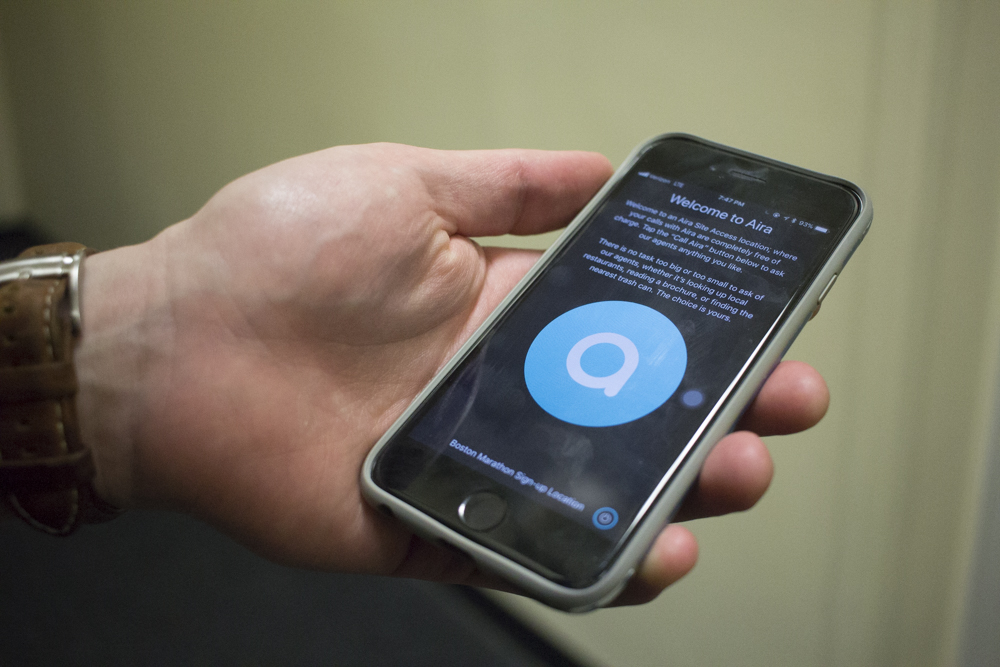
Erich Manser, of Littleton, is an Ironman world-record holder. In his 45 years, he has run 18 marathons. He will be running the Boston Marathon — his 19th — using an app and a sighted guide. Manser is blind, and said he used the smartphone app Aira last year for the first time.
Aira helps the low-vision community gain more independence in a “game changing” way, he said.
“It enables people to do things that they have never been able to do independently before,” Manser said. “To have it expand to be a personal assistant always there for everyone is an exciting possibility, I think.”
This year, all individuals who are blind or visually impaired can navigate Boston during Marathon Monday via the Aira app — for free.
Boston Mayor Martin Walsh announced Friday that there will be free access to the smartphone app Aira during One Boston Day (before the marathon) and the Boston Marathon itself.
The Aira app connects blind and visually impaired people with trained professionals who have experience as “visual interpreters,” and see through the user’s smartphone camera to describe their environment, according to Aira’s website. The app will be free for visitors and residents around the city and the Marathon route, and will continue until Tuesday, April 17.
During this time, the app plans to provide blind individuals with accessibility across Boston during this time, whether it’s to find a spot along the route to get a live description of the race, or perform “random acts of kindness around the city,” according to Aira’s website.
This partnership with Aira is a part of the City’s current pledge to be more accessible to those with disabilities, Kristen McCosh, of the Boston’s Disabilities Commission, said in a press release.
“This initiative demonstrates Mayor Walsh’s ongoing commitment to ensure that the city of Boston is not only accessible, but is also fully inclusive of people with disabilities,” McCosh said.
Aira currently serves over 300 million individuals who are blind or visually impaired across the world. Free access to the service during the Boston Marathon weekend is an attempt to pilot this technology for potential future use throughout the city, according to the release.
The mayor is not the first to partner with Aira. The Massachusetts Association for the Blind and Visually Impaired teamed up with the app after hosting a summit in 2016 about the way present technology changes the lives of the visually impaired, said the organization’s Chief Advancement Officer David Brown.
This app allows people who are blind or with vision impairment a higher degree of independence and gives them a new way to interact with their environment, he said.
“The big disconnect is that technology and innovators that are creating the technology don’t necessarily know the community that they are benefiting,” Brown said. “It’s important for the blind community to be out in front of technology and that’s the way Aira works.”
Though Aira can be purchased by individuals as a monthly subscription, the visually impaired community would like to see cities and workplaces pick up the tab, Brown said. While the MABVI provides Aira to all of their employees, Brown said he would like to see this trend become commonplace among large organizations and even, to an extent, municipalities.
“The cost is another barrier … 70 percent [of the BLV community] are unemployed or underemployed,” Brown said. “What Aira is doing is genius because they realize there is a population that wants the blind to shop at their stores and be a part of the city.”
Manser said he’s excited to see how the app has improved since the last time he used it.
“We knew going in last year that this wasn’t an activity that the technology was designed for, so it was really an extreme test for it,” Manser said. “The whole point of doing it was to come back and share with the team at Aira what worked and what didn’t work so that they could take that information and go back and make changes.”























































































































Linda and Gary Kapfer • Apr 14, 2018 at 2:42 pm
Technology!!! Wow!! Great article re: this app for the blind. The description of what the app does could have been a bit more extensive, Samantha. If I got it right, the blind person walks here and there in the city with phone in hand pointing at his surroundings, while someone knowledgeable of the city relates to the blind person where he is by means of that phone. Right? Good idea, and informative.
Thanks, Samantha, for sharing your work with us. We love you, and are so very proud of you.